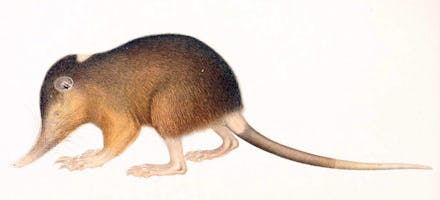A Small, Venomous Mammal Outlived the Asteroid That Killed the Dinosaurs

On the island of Hispaniola, which houses Haiti and the Dominican Republic, lives a small, rodent-like mammal that packs a lot more survivability than its size may suggest. Not only are they venomous, but a new discovery suggests they're also asteroid-surviving — as in the asteroid that wiped out the dinosaurs, according to CNN.
It's called the Hispaniolan solenodon, and using two methods of DNA sequence examination, researchers have discovered that the now-endangered species scuttling about Hispaniola and Cuba diverged from mammals from 78 million years ago. In fact, these little guys are the last of an ancient mammal group.
"It's just impressive it's survived this long," study co-author Adam Brandt said in a press release. "It survived the asteroid; it survived human colonization and the rats and mice humans brought with them that wiped out the solenodon's closest relatives."
Given the nature of the solenodon, collecting DNA required some creativity. "UPR Professor of Genetics Taras Oleksyk and his team collected samples by laying on the ground and waiting for the solenodons to crawl across their bodies," according to the press release.
Researchers hypothesize that the solenodon made its way onto Hispaniola when it was still attached to Mexico via a volcanic arch. Nowadays, solenodons' survival is threatened by habitat loss from humans and predatory pet cats and dogs.
Which is to say, if, after 78 million years of dodging dinosaurs and surviving Earth-shattering asteroids, these guys haven't earned the right to some peace and quiet, the rest of us are pretty much out of luck.
Read more: Pesticides Are Harming Nearly Every Endangered Species in the US